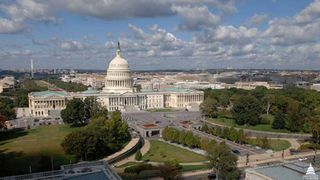FCC Reauthorization Bill to Include TV Repack Fund Boost

The House Energy & Commerce Committee Wednesday (Feb. 14) will mark up a bill that will include a valentine to broadcasters (and potentially some cable operators)--more money for the post-incentive auction repack.
Update: FCC Reauthorization Bill Bulks Up
The mark-up--a session to amend and vote on bills--will include H.R. 4986, the FCC Reauthorization Act of 2018, which passed out of the Communications Subcommittee unanimously, but with the suggestion that the harder work, and amendments, would come in the full committee.
One of those amendments would authorize a fund to handle the apparent shortfall in the $1.75 billion fund per an amendment to be added at the markup.
Rep. Frank Pallone (D-N.J.), ranking member of the committee, has pushed for boosting the repack funds for broadcasters to make sure that viewers are not adversely impacted by the repack.
Related: FCC Reauthorization Bill Referred to Full Committee
The FCC has conceded that $1.75 billion will likely undershoot the mark by several hundred million dollars. The bill would also set aside money to help relocate translators and low power stations displace by the repack. They were not made part of the repack fund, and their channels not protected in the repack.
"NAB strongly backs passage of RAY BAUM’s Act addressing the funding shortfall stemming from the spectrum auction 'repack,'" said National Association of Broadcasters President Gordon Smith, referencing former Committee staff director and NAB exec Ray Baum, who died last week. "Full-power TV and radio stations -- along with low-power TV stations and TV translators -- provide news, entertainment and lifeline programming to tens of millions of Americans every day.
"NAB is committed to working on a bipartisan basis in both the House and Senate to secure sufficient funding to cover the cost of broadcaster repack relocation costs."
The FCC reauthorization also was expected to incorpoate provisions from the Senate's MOBILE Now Act, which would make sure that the FCC made mid-band spectrum available for commercial use (for 5G) by 2020, but that ultimately did not make it onto the planned substitute amendment, though a committee source said the committee continues to work with the Senate on the issue.
The bill also incorporates Rep. Anna Eshoo's (D-Calif.) FCC Collaboration Act, which would allow more than two commissioners to meet outside of public meetings so long as certain sunshine criteria are met. Eshoo, the former ranking member of the Communications Subcommittee, has long pushed for the change.
Among the FCC reforms, in addition to allowing a majority of the commissioners to meet outside of the monthly meetings, include setting minimum comment periods; reporting to Congress on the status of open proceedings--some of which have historically been open for years--including on who hasn't voted on items on circulation; look into allowing a bipartisan majority of members to put items on the agenda for an open meeting vote--a privilege now reserved to the chairman; insuring that commissioners have enough time to review items before voting on them and that the public has a chance to read the text of an item before a vote, set deadlines for decisions on license applications, and much more.
The bill also sets a deadline for publication of an item in the Federal Register, which triggers the effective date of said rules, and the ability of outside parties to challenge them in court. That issue is currently of particular interest since the Federal Register has yet to publish the FCC's Dec. 14 decision to roll back net neutrality rules.
Broadcasting & Cable Newsletter
The smarter way to stay on top of broadcasting and cable industry. Sign up below
Contributing editor John Eggerton has been an editor and/or writer on media regulation, legislation and policy for over four decades, including covering the FCC, FTC, Congress, the major media trade associations, and the federal courts. In addition to Multichannel News and Broadcasting + Cable, his work has appeared in Radio World, TV Technology, TV Fax, This Week in Consumer Electronics, Variety and the Encyclopedia Britannica.

